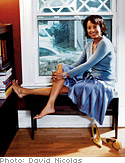Defending My Life

Both her mother and her father wrestled with
breast cancer. She was sick of radiologists and mammograms, tired of watching,
waiting, fearing the worst. So former anchorwoman René Syler made one of the
most difficult—and strangely exhilarating—decisions of her life.
December 15, 2006Most women may forget about their breasts until they put on a bra or have sex. But I think about mine all the time. I look at them, study them, wonder if something heinous is growing inside them—the deformed one, a constant reminder of the trouble they've been to me over the past several years.
Then I think, "In less than a month, after my mastectomy, they won't be with me anymore. What will I look like? What will I feel like?"
Just curious.
December 23
Time: dark. Place: Kiawah Island, South Carolina. We ran out of New York City yesterday, and man, did I need to get out of there. The past month has been hell, because in the midst of preparing for life-changing surgery, I lost my job as an anchor on The Early Show. Oh, and did I mention, we're also renovating the house? So, huge surgery looming, getting fired, house torn up—the only thing missing is divorce, and I probably should check with Buff on his intentions!
When I got fired, all the energy I'd been spending on myself had to be transferred to wrapping things up at CBS. I haven't really had much time to absorb all the nuances of what's about to happen to my body. All I know is that I feel very tired, not just physically but emotionally, too, and the number of gray hairs has quadrupled overnight.
I'm on my way, this afternoon, to pick up Mom. She'll spend Christmas with us in Kiawah. You know what that means? Many more gray hairs.
December 24
My kids, Casey, 10, and Cole, 8, are trying to make up for 364 days of bickering. I need to tell them that Santa has a really long memory.
Fortunately, Mom is not making me crazy yet. It's actually very nice to see her because she does know what it's like to deal with breast issues. She was diagnosed with breast cancer at age 64, when I was pregnant with Cole. I remember her calling and asking me if I was sitting down. I said yes, and that's when she dropped the bomb. It stole the wind from my lungs, because if there were ever an unlikely candidate for breast cancer, it would be Anne Syler. She ate well and exercised long before it was fashionable to do so, didn't drink excessively. At the time, she was the picture of health.
Later she confided how much she feared the "legacy" she was leaving my sister and me. I tried to make her understand that she hadn't done anything to get BC; it was just an unlucky draw. But I wonder if she feels responsible for my health problems. I hope she doesn't.
December 26
Not only was my mother a breast cancer patient (nine years later, she is doing well, praise God); my father had it too. Male breast cancer is rare, only about 1,700 cases are diagnosed each year in the United States. So when you tell a doctor your father had breast cancer, it's a big red-flag moment.
I had my first mammogram in 1992. I was 29. It turns out that I don't have the breast cancer gene, and things were all right until my late 30s. Then little white flecks started showing up on the film, like buckshot on my breast—microcalcifications, which can indicate cancer. I used to always schedule my mammograms near my birthday, a gift of health and life to myself. In 2003, my present was a long-faced radiologist who said, "You need a biopsy." I had a fibroid adenoma removed from the right breast. No cancer. The buckshot-looking stuff in my left breast was taken out, too. No cancer. Whew. But I was diagnosed with a condition called atypical ductal hyperplasia, which substantially raises your odds of BC.
A year later, another biopsy. Left breast, same diagnosis: No cancer.
And the next year, you guessed it. Cut open again, same breast, same diagnosis: No cancer.



